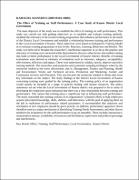| dc.description.abstract | KAMALHA ASANSIOUS (2009-M101-10002)
The Effect of Training on Staff Performance: A Case Study of Kasese District Local Government
The main objective of the study was to establish the effect of training on staff performance. This study was carried out with guiding objectives as: to establish and evaluate training methods, establish the relevance of the current training programmes that enhances performance to the needs of the District Local Government and establish a relationship between training and performance in the Local Government of Kasese. These objectives were based on Kirkpatrick Training Model as it evaluates training programmes at four levels: Reaction, Learning, Behaviour and Results. The study was believed to broaden the researcher‟s intellectual capacities in so far as the practice and relevance of training was concerned while determined to discover other factors that enable training that leads to better performance in the Local Government of Kasese District. Benefits of training evaluations were derived as elements of evaluation such as relevance, adequacy, acceptability, effectiveness, efficiency and impact. These were understood to validate, justify, improve and select training methods. The researcher used purposive and systematic sampling techniques where by the researcher looked at the seven directorates, that is, Management, Finance and Planning, Health and Environment, Works and Technical services, Production and Marketing, Gender and Community services and Education. This was because the researcher needed to obtain data from key informants on the subject. The study findings in the District Local Government of Kasese concerning training were guided by the training policy. The training policy of an organisation would usually be included in a range of policies dealing with human resources. The policy statements set out what the Local Government of Kasese district was prepared to do in terms of developing her employees upon realisation that there was a clear relationship between training and performance. This means that training plays a significant role in influencing staff performance. The study concluded that training consists of an organisation‟s planned efforts to help employees acquire job-related knowledge, skills, abilities, and behaviours, with the goal of applying these on the job in realisation of performance related parameters. It recommended that induction and orientation of new employees should be given priority. In addition, performance appraisal criteria should be used as a major mechanism of identifying Training Needs Assessments, and other factors needed to be in harmony for the staff performance to go on smoothly. These include; bureaucracy, remuneration and pay, availability of resources and facilitation, supervision and political patronage and interferences.
Key Words: Effect, Training, Staff Performance, Local Government, Kasese District | en_US |


